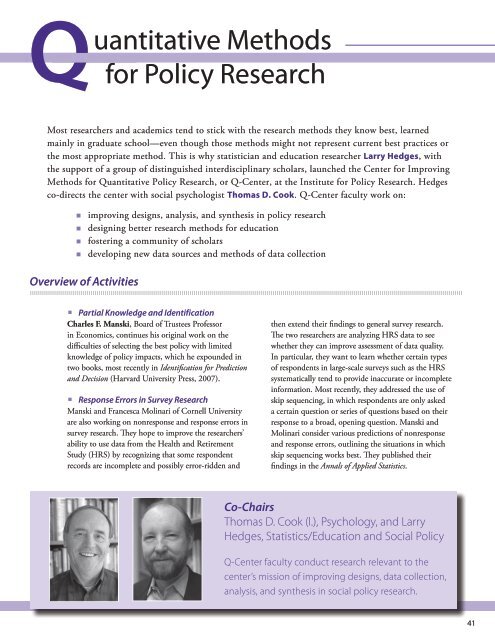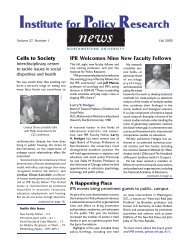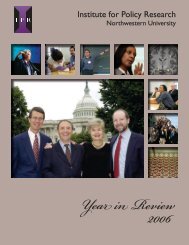IPR - Institute for Policy Research - Northwestern University
IPR - Institute for Policy Research - Northwestern University
IPR - Institute for Policy Research - Northwestern University
You also want an ePaper? Increase the reach of your titles
YUMPU automatically turns print PDFs into web optimized ePapers that Google loves.
Q<br />
uantitative Methods<br />
<strong>for</strong> <strong>Policy</strong> <strong>Research</strong><br />
Most researchers and academics tend to stick with the research methods they know best, learned<br />
mainly in graduate school—even though those methods might not represent current best practices or<br />
the most appropriate method. This is why statistician and education researcher Larry Hedges, with<br />
the support of a group of distinguished interdisciplinary scholars, launched the Center <strong>for</strong> Improving<br />
Methods <strong>for</strong> Quantitative <strong>Policy</strong> <strong>Research</strong>, or Q-Center, at the <strong>Institute</strong> <strong>for</strong> <strong>Policy</strong> <strong>Research</strong>. Hedges<br />
co-directs the center with social psychologist Thomas D. Cook. Q-Center faculty work on:<br />
• improving designs, analysis, and synthesis in policy research<br />
• designing better research methods <strong>for</strong> education<br />
• fostering a community of scholars<br />
• developing new data sources and methods of data collection<br />
Overview of Activities<br />
< Partial Knowledge and Identification<br />
Charles F. Manski, Board of Trustees Professor<br />
in Economics, continues his original work on the<br />
difficulties of selecting the best policy with limited<br />
knowledge of policy impacts, which he expounded in<br />
two books, most recently in Identification <strong>for</strong> Prediction<br />
and Decision (Harvard <strong>University</strong> Press, 2007).<br />
< Response Errors in Survey <strong>Research</strong><br />
Manski and Francesca Molinari of Cornell <strong>University</strong><br />
are also working on nonresponse and response errors in<br />
survey research. They hope to improve the researchers’<br />
ability to use data from the Health and Retirement<br />
Study (HRS) by recognizing that some respondent<br />
records are incomplete and possibly error-ridden and<br />
then extend their findings to general survey research.<br />
The two researchers are analyzing HRS data to see<br />
whether they can improve assessment of data quality.<br />
In particular, they want to learn whether certain types<br />
of respondents in large-scale surveys such as the HRS<br />
systematically tend to provide inaccurate or incomplete<br />
in<strong>for</strong>mation. Most recently, they addressed the use of<br />
skip sequencing, in which respondents are only asked<br />
a certain question or series of questions based on their<br />
response to a broad, opening question. Manski and<br />
Molinari consider various predictions of nonresponse<br />
and response errors, outlining the situations in which<br />
skip sequencing works best. They published their<br />
findings in the Annals of Applied Statistics.<br />
Co-Chairs<br />
Thomas D. Cook (l.), Psychology, and Larry<br />
Hedges, Statistics/Education and Social <strong>Policy</strong><br />
Q-Center faculty conduct research relevant to the<br />
center’s mission of improving designs, data collection,<br />
analysis, and synthesis in social policy research.<br />
41
















